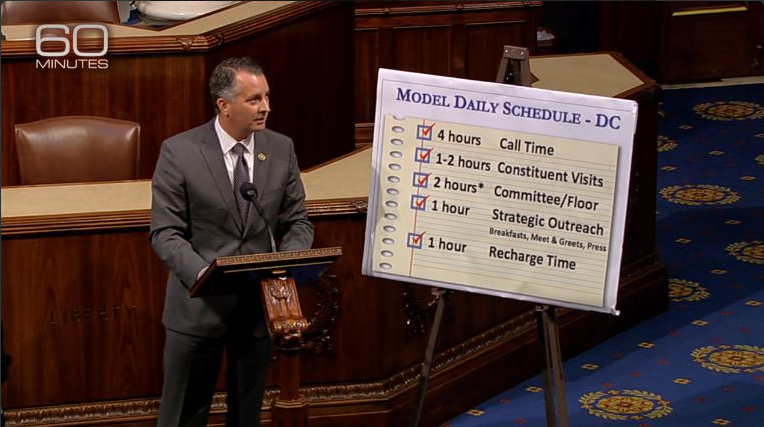Archived
What’s Happening in the States? February 2016 Edition
Although we’ve reached the cold months of winter, states and municipalities have stayed hot in their fight to reduce the influence of money in politics. Here are the reform fights…
Archived
On Sunday’s 60 Minutes program, two members of Congress blew the whistle on the “shameful” practice of fundraising 30 hours a week.
Imagine that. Thirty hours is a full work-week for most white-collar Americans once you subtract lunch breaks, browsing Facebook and chatting in the breakroom.
Rather than doing the job they were elected to do—putting our nation’s fiscal house in order, for example, or ensuring a strong national defense in times of international conflict—they have become little more than telemarketers.
So, Reps. David Jolly (R-FL) and Rick Nolan (D-MN) said they’d had enough of business as usual, cramped cubicles, and raising money from an increasingly shrinking percentage of Americans that frequently aren’t part of their constituency.
ReFormer Caucus member Tim Roemer told Media General the pressure to raise money has been a “tsunami” hitting national politics. In the past year, public opinion polls agree – more than 80 percent of Americans believe money has more influence than ever and want to see fundamental changes in the way we fund our elections.
.@60Minutes showed Congress is in
crisis — I agree. https://t.co/61XqQ0OfFM #ReFormers @IssueOneReform— Dan Glickman (@DanRGlickman) April 25, 2016
To put this in perspective: the average House member needs to raise nearly $1.6 million to win reelection every two years. Senate seats cost an average of $10.4 million every six years.
In Jolly’s case, he is running for the Senate seat in Florida vacated by former Republican presidential hopeful Marco Rubio. He has been promoting the Stop Act, a bill that would prohibit members of Congress from directly soliciting political contributions, although they could still attend fundraisers and speak with donors. It would send a clear message: Congress shouldn’t govern part-time. The bill’s six co-sponsors agree.
Rep. Jolly described the call centers, where members of Congress cold call donors in search of big checks, as “a cult-like boiler room on Capitol Hill where sitting members of Congress frankly I believe are compromising the dignity of the office they hold by sitting in these sweatshop phone booths calling people asking them for money.”
There are a handful of other potential reforms, some bipartisan, sitting in the U.S. Capitol, that would address how our campaigns are funded, strengthen disclosure and transparency, empower watchdogs like the FEC and IRS. There’s no shortage of solutions.
While Congressmen Jolly and Nolan showed real leadership speaking to 60 Minutes and millions of Americans sitting at home, it is time for Congress to get back to work and pass meaningful legislation so they have the freedom to lead again.
Issue: ReFormers Caucus
Archived
Although we’ve reached the cold months of winter, states and municipalities have stayed hot in their fight to reduce the influence of money in politics. Here are the reform fights…
Archived
Tomorrow the conservative money-in-politics group Take Back Our Republic (TBOR) will be holding a rally in front of the White House to urge President Obama to issue an executive order…
Archived
Yesterday, President Obama traveled to Illinois to deliver a speech on the “better politics” he described last month in his final State of the Union. The main thrust? In order…
 (60 Minutes, David Jolly)
(60 Minutes, David Jolly)
